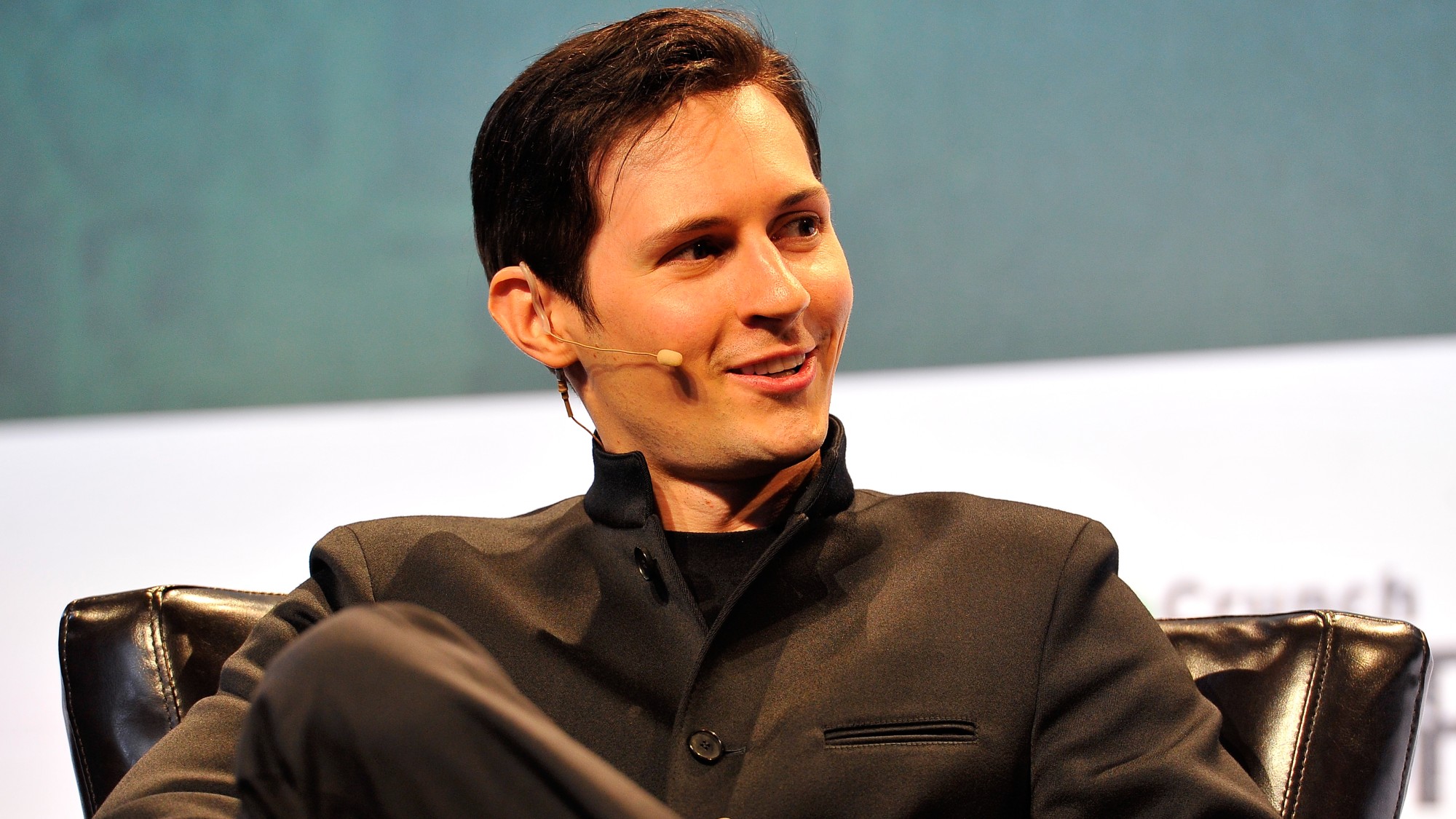How does Telegram work and why is it controversial?
The messaging platform has long been criticised for its soft approach to moderation, with claims this facilitates criminal content

A free daily email with the biggest news stories of the day – and the best features from TheWeek.com
You are now subscribed
Your newsletter sign-up was successful
Telegram CEO Pavel Durov was arrested by French authorities this week on charges including complicity in drug trafficking and facilitating the spread of child sexual abuse material, as part of a broader investigation into illegal activities on the messaging platform he founded.
Durov is also accused of money laundering, and collaborating with organised crime, according to a statement released by French prosecutor Laure Beccuau. The accusations also included improper use of cryptography, and failure to allow authorised law enforcement interception, both of which have been "flash points in the efforts by some governments to force companies to reveal private messages between users", according to The Washington Post.
Durov was granted bail of €5 million and, as a condition of his release, is prohibited from leaving France and must report to a French police station twice a week.
The Week
Escape your echo chamber. Get the facts behind the news, plus analysis from multiple perspectives.

Sign up for The Week's Free Newsletters
From our morning news briefing to a weekly Good News Newsletter, get the best of The Week delivered directly to your inbox.
From our morning news briefing to a weekly Good News Newsletter, get the best of The Week delivered directly to your inbox.
Why is Durov's arrest significant?
The arrest is the "most dramatic action to date" in the "global fight between officials and tech companies over limits to harmful content", said The Washington Post. Durov's arrest "reignites a fierce debate" over free speech on social media platforms, as governments step up efforts to "police the role of social media and messaging platforms in spreading illegal and false information", said the paper.
Telegram has come under particular scrutiny in recent years as online experts have argued that the platform has created a "uniquely ripe environment for harmful activity" despite other social media platforms also drawing similar scrutiny. Even so, Durov's arrest is a "sharp break" from the norm, said The Guardian.
While governments have exchanged "strong words" with social media platforms and messaging platforms before, "rarely have there been arrests".
What exactly is Telegram?
The globally popular messaging platform offers both broadcast channels – where users can send messages to large groups of people – and user-to-user chats.
A free daily email with the biggest news stories of the day – and the best features from TheWeek.com
It also offers what it calls "secret chat" conversations that are end-to-end encrypted, which means that messages are decipherable only to participants in the conversation and no one – including Telegram itself – can see the contents of these chats.
Why is Telegram so controversial?
Telegram's "secret chat" feature and self-deleting messages have made it an "extremely useful" tool for political dissidents and journalists in repressive regimes, said Vox. But its "anything-goes approach to moderation" means that it has become not only a "megaphone" for global leaders such as Ukrainian president Volodymyr Zelenskyy, but also for nefarious groups such as Islamic State and Hamas, said the Financial Times.
Since its founding, Telegram has "allegedly enabled some truly shocking crimes," including coordinating IS attacks in Paris and Berlin, said Vox. Although the platform "cracked down on IS-based activity" after these attacks, its content moderation has remained under fierce scrutiny.
Critics frequently argue that Telegram "acts as a magnet for the lawless, for disinformation pushers, conspiracy theorists and extremists" who are increasingly restricted on platforms like Facebook and YouTube, added the FT. Experts also warn that Telegram is "increasingly weaponised for propaganda by the very governments whose citizens may rely on it for information". And its Dubai headquarters have allowed it to evade much of the regulatory scrutiny facing Silicon Valley platforms.
How is Telegram different from WhatsApp?
Telegram markets itself as a secure messaging platform, but unlike WhatsApp and Signal, it does not offer end-to-end encryption by default. This encryption is only available in its "secret chat" feature, meaning most conversations are encrypted "only insofar as they can't be read by any random person connected to your wifi network", explained The Guardian.
While Telegram markets itself as a more secure alternative to WhatsApp and Signal, especially against US government surveillance, in reality, it lacks the protection its competitors offer. Unlike its end-to-end encrypted rivals, "if a government comes knocking at Telegram's door asking for information on a wrongdoer, real or perceived, Telegram doesn't have the same safety that its peers do", said the paper. And by trying to straddle both private and public messaging, Telegram "may have lost the defences of either".
What's next for Telegram and other platforms?
It's unclear. Telegram is just one of several platforms criticised for poor moderation and failing to combat child abuse content, disinformation, and extremist material.
Meta, for example, has been accused of contributing to violence against the Rohingya in Myanmar by failing to curb the spread of fake news and hate speech on its platforms. Meanwhile, a 2022 Unesco study found that nearly half of Holocaust-related content on Telegram involved denial or distortion, a higher rate than on Twitter, TikTok or Facebook.
A "worrisome outcome" of France's possible prosecution of Telegram is that it could "embolden countries around the world to prosecute platform CEOs criminally for failing to turn over user data", said Platformer.
But at the same time, Telegram "really does seem to be actively enabling a staggering amount of abuse", the site added. While it's alarming to see state power used to snoop on private conversations, it's equally troubling to see a private company "declare itself to be above the law".
Sorcha Bradley is a writer at The Week and a regular on “The Week Unwrapped” podcast. She worked at The Week magazine for a year and a half before taking up her current role with the digital team, where she mostly covers UK current affairs and politics. Before joining The Week, Sorcha worked at slow-news start-up Tortoise Media. She has also written for Sky News, The Sunday Times, the London Evening Standard and Grazia magazine, among other publications. She has a master’s in newspaper journalism from City, University of London, where she specialised in political journalism.
-
 How the FCC’s ‘equal time’ rule works
How the FCC’s ‘equal time’ rule worksIn the Spotlight The law is at the heart of the Colbert-CBS conflict
-
 What is the endgame in the DHS shutdown?
What is the endgame in the DHS shutdown?Today’s Big Question Democrats want to rein in ICE’s immigration crackdown
-
 ‘Poor time management isn’t just an inconvenience’
‘Poor time management isn’t just an inconvenience’Instant Opinion Opinion, comment and editorials of the day
-
 Moltbook: The AI-only social network
Moltbook: The AI-only social networkFeature Bots interact on Moltbook like humans use Reddit
-
 Are Big Tech firms the new tobacco companies?
Are Big Tech firms the new tobacco companies?Today’s Big Question A trial will determine whether Meta and YouTube designed addictive products
-
 Can Europe regain its digital sovereignty?
Can Europe regain its digital sovereignty?Today’s Big Question EU is trying to reduce reliance on US Big Tech and cloud computing in face of hostile Donald Trump, but lack of comparable alternatives remains a worry
-
 Claude Code: Anthropic’s wildly popular AI coding app
Claude Code: Anthropic’s wildly popular AI coding appThe Explainer Engineers and noncoders alike are helping the app go viral
-
 Is social media over?
Is social media over?Today’s Big Question We may look back on 2025 as the moment social media jumped the shark
-
 Most data centers are being built in the wrong climate
Most data centers are being built in the wrong climateThe explainer Data centers require substantial water and energy. But certain locations are more strained than others, mainly due to rising temperatures.
-
 Australia’s teen social media ban takes effect
Australia’s teen social media ban takes effectSpeed Read Kids under age 16 are now barred from platforms including YouTube, TikTok, Instagram, Facebook, Snapchat and Reddit
-
 Why Trump pardoned crypto criminal Changpeng Zhao
Why Trump pardoned crypto criminal Changpeng ZhaoIn the Spotlight Binance founder’s tactical pardon shows recklessness is rewarded by the Trump White House